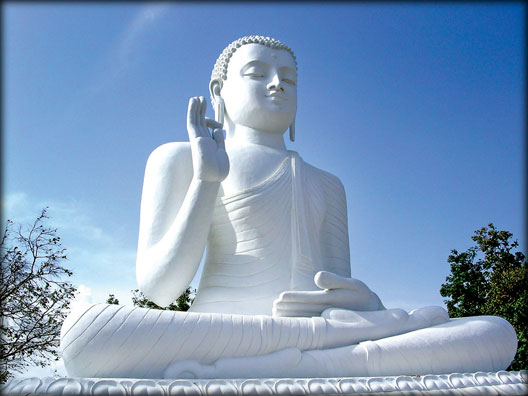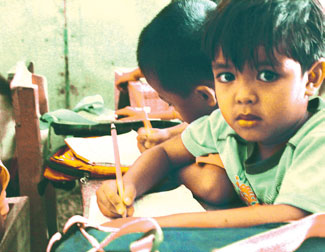|
 Today is Il Full Moon Poya Day: Today is Il Full Moon Poya Day:
Buddhist vision of social justice
By Lionel Wijesiri
Buddhism has a reputation in the modern world as a religion
encouraging peace and social justice. Broadly speaking, the term ‘social
justice’ implies fairness and mutual obligation in society: That we are
responsible for one another and that we should ensure all have equal
chances to live free and succeed in life. Since an individual can
experience freedom only in a moral society, the rights and duties of
such individual may be held as inter-connected.
The concept of social justice, which was central to the political
thought generating and sustaining the French Revolution in the late 18th
Century, is over two centuries old. Interestingly, over 2,500 years ago,
Gautama Buddha raised the issue of liberty, equality and fraternity
against the tyrannical and hierarchical social system in India at the
time.
The Buddha understood the deeper significance of human existence. He
said that no super human or divine entity, other than one’s own deeds,
would change one’s destiny. His practical philosophy is concerned with
the ways that would help in the elimination of human suffering. He
presented His doctrine which explained clearly the human suffering, and
also the way to its elimination.
If we investigate the Buddha’s teaching on the Sublime States: Metta,
Karuna, Mudita and Upekkha (Loving-kindness, Compassion, Sympathetic Joy
and Equanimity) towards living beings, then we will realise that we
ourselves are responsible for our own well-being and that of society as
well.
 |
|
According to the
Buddha, existence, both animate and inanimate, is in a
dynamic state of flux |
This planet is our home and each of us has the right to live here as
do all other beings, animals, trees, plants and every other kind of
living organism. This is to say that the development of animate and
inanimate things in this world are inter-connected and inter-dependent,
so that worldly and spiritual growth is dependent upon everyone and
everything else in this world. Nothing exists or can develop
independently. This is the teaching of the Buddha.
Right livelihood
The modern social scientists proclaim that for a healthy society, two
components - freedom and morality - are essential. According to the
Buddha, morality is not only the foundation of our social path, but the
axis upon which the whole of our spiritual development revolves.
Buddhism encourages people to develop their minds and purify them
through the practice of morality, concentration and wisdom.
In the Buddha’s moral teachings, Right Livelihood (Samma Ajiva)
figures prominently. In His first sermon after attaining Enlightenment,
the Buddha explained that the way to peace, wisdom and finally, Nirvana
is the Noble Eightfold Path.
The fifth ‘fold’ of the path is Right Livelihood, which is the way to
earn a living that does no harm to others. In the Vanijja Sutta, the
Buddha said, “A lay follower should not engage in five types of
business-business in weapons, business in slaves, business in meat,
business in intoxicants and business in poison.”
The Buddhist concept of ‘livelihood’, therefore, implies not only a
pure and transparent means of earning one’s living, but it is also to be
morally responsible towards the society. If we do not take any
responsibility for society, then our minds will be overpowered by
self-interest and we will become selfish and uncaring.
Eventually, this would result in us not behaving in a moral or just
and righteous way in our day-to-day dealings with other people. The
precept about Right Livelihood was designed to bring true happiness to
the individual and society and to promote unity and proper relations
among people.
Happiness
We find several modes of ‘true’ happiness in Buddhist literature. In
one mode, the Buddha speaks about four types of happiness. A person who
lives in the society without retiring into a life of seclusion may enjoy
four kinds of happiness:
* The happiness of earning (Atthi-sukha) wealth by just and righteous
means
* The happiness of using (Bhoga-sukha) wealth liberally on family,
friends and on meritorious deeds
* The happiness of being without debt (Anana-sukha)
* The happiness of blamelessness (Anavajja-sukha), to live a faultless
and pure life without committing evil in thought, word and deed.
According to this mode, true happiness is to enjoy material welfare,
monetary or economic security through fair and righteous means.
Happiness can also be enjoyed by using the wealth liberally for one’s
self, for one’s family, friends, and relatives and by wholesome deeds.
Happiness likewise can be enjoyed from becoming debt-free. Then, there’s
happiness that is enjoyed through blamelessness resulting from the
avoidance of unwholesome deeds.
As evident from the discourse, true happiness of ownership, wealth
and being debt-free refer to economic security and stability whereas
happiness of blamelessness refers to a higher level of happiness which
is spiritual or psychological.
Potential
Buddhists view all human beings as equal; therefore Buddhism is
committed to the principle of human equality. The Buddha criticised the
caste system which divided the society in to upper and lower castes,
thereby depriving the lower castes of certain rights. Repudiating the
superiority by birth, He said: “No Brahman is such by birth, no outcaste
is such by birth, an outcaste is such by his deeds, and a Brahman is
such by his deeds.”
The Buddha also condemned exploitation of labour in every form. He
asserted five ways in which an employer should serve his employees:
* Work should be assigned in proportion to the employees’ health
* Proper food and wages be given to them
* Proper care should be taken in their sickness
* Specially tasty luxuries should be shared with them and
* Holidays should be given to them at intervals.
 |
|
Child welfare is one of the basic
requisites of the development of social justice |
The Buddha was so compassionate to the working class that He stressed
that they be treated with as much consideration as a member of one’s own
family.
The Buddha saw the spiritual potential of men and women and founded
the Order of Bhikkhunis, one of the earliest organisations for women.
The Sasana consisted of the Bhikkhus, Bhikkhunis, laymen and laywomen so
that the women were not left out of any sphere of religious activity.
The highest spiritual states were within the reach of both men and
women and the latter needed no masculine assistance or priestly
intermediary to achieve them. We could therefore, conclude that Buddhism
accorded to women a position approximating to equality.
Although there are no vows or rituals involved in the event of a
marriage, the Buddha has laid down in the Sigalovada Sutta the duties of
a husband and wife: “In five ways should a wife be ministered to by her
husband; by respect, by courtesy, by faithfulness, by handing over
authority to her and by providing her with ornaments.
The wife’s duties are well-performed by hospitality to the kin of
both, by faithfulness, by watching over the goods he brings and by skill
and industry in discharging all business.”
The significant point here is that the Buddha’s injunctions are
bilateral; the marital relationship is a reciprocal one with mutual
rights and obligations.
Buddhism is a pragmatic teaching based on certain fundamental
propositions about how we experience the world and how we act in it.
From the evidence of the Buddha’s discourses, it is clear that early
Buddhists were very much concerned with the creation of social
conditions favourable to the individual cultivation of Buddhist values.
|

